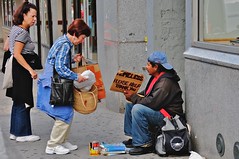| 4819643097 | fundamental attribution error | def: the tendency for observers, when analyzing another's behavior, to underestimate the impact of the situation and to overestimate the impact of personal disposition ex: they are speeding because they are a jerk (don't know that they are driving to the hospital) |  | 0 |
| 4819643098 | hostile aggression | def: being mean or violent to another for the sake of causing them harm ex: punching someone in the face |  | 1 |
| 4819643101 | foot-in-the-door phenomenon | def: the tendency for people who have first agreed to a small request to comply later with a larger request ex: get you to volunteer for one hour at a charity, then get you to volunteer several hours a week |  | 2 |
| 4819643103 | cognitive dissonance | def: the uncomfortable feeling that arises when our actions do not match our feelings/beliefs ex: a pacifist punches someone, feels discomfort about his action |  | 3 |
| 4819643104 | conformity | def: adjusting one's behavior or thinking to coincide with a group standard ex: wear clothes that are "popular" |  | 4 |
| 4819643106 | normative social influence | def: influence resulting from a person's desire to gain approval or avoid disapproval ex: applaud even when you don't like what just happened to avoid other people's judgement |  | 5 |
| 4819643108 | social facilitation | def: individual effort increases when in a larger group ex: perform better athletically when there is a big crowd |  | 6 |
| 4819643109 | social loafing | def: the tendency for people in a group to exert less effort when pooling their efforts toward attaining a common goal than when individually accountable ex: group projects |  | 7 |
| 4819643110 | deindividuation | def: the loss of self-awareness and self-restraint occurring in group situations that foster arousal and anonymity ex: soldiers killing during wartime |  | 8 |
| 4819643111 | group polarization | def: individual opinions become more extreme when a part of a group ex: group is against an idea, then listens to another opinions, and the group as a whole changes its opinion to the topic |  | 9 |
| 4819643112 | group think | def: the mode of thinking that occurs when the desire for harmony in a decision-making group overrides a realistic appraisal of alternatives ex: mass suicides, Bay of Pigs, riots |  | 10 |
| 4819643113 | testosterone | the number one indicator of aggression - being a male and this.... |  | 11 |
| 4819643114 | norm | def: an understood rule for accepted and expected behavior. Norms prescribe "proper" behavior ex: Muslim women wear hijabs/other veils |  | 12 |
| 4819643116 | prejudice | def: an unjustifiable (and usually negative) attitude toward a group and its members. Prejudice generally involves stereotyped beliefs, negative feelings, and a predisposition to discriminatory action ex: a person believes that people from Bali are less intelligent than those from Nepal |  | 13 |
| 4819643117 | stereotype | def: a generalized (sometimes accurate but often overgeneralized) belief about a group of people ex: Asian people are smarter than white people. |  | 14 |
| 4819643118 | discrimination | def: unjustifiable negative behavior toward a group and its members ex: against African Americans in 20th century |  | 15 |
| 4819643119 | ingroup | def: "Us"- people with whom we share a common identity ex: team you support |  | 16 |
| 4819643120 | outgroup | def: "Them"- those perceived as different or apart from our ingroup ex: rival team |  | 17 |
| 4819643121 | ingroup bias | def: the tendency to favor our own group ex: think your team is better than the other |  | 18 |
| 4819643124 | just-world phenomenon | def: the tendency for people to believe the world is just and that people therefore get what they deserve and deserve what they get ex: you get a good grade on a test because you are a good person. A different person gets a bad grade because they are a bad person. |  | 19 |
| 4819643125 | instrumental aggression | def: any physical or verbal behavior intended to hurt or destroy in order to gain a particular goal ex: hitting your sibling until they give you back something they stole |  | 20 |
| 4819643126 | frustration-aggression hypothesis | def: the principle that frustration - the blocking or an attempt to achieve some goal- creates anger, which can generate aggression ex: person becomes frustrated with job then becomes aggressive at home to redirect frustration |  | 21 |
| 4819643127 | mere exposure effect | def: the phenomenon that repeated exposure to novel stimuli increases liking of them ex: see an advertisement for a product so many times you grow to like that product |  | 22 |
| 4819643129 | reciprocal altruism | def: unselfish regard for the welfare of others in order to receive something in return ex: being nice to a friend with the hopes they are nice to you back |  | 23 |
| 4819643130 | bystander effect | def: the tendency for any given bystander to be less likely to give aid if other bystanders are present ex: see a car wrecked on the side of the road but don't stop because you think someone else will |  | 24 |
| 4819643132 | norm of reciprocity | def: an expectation that people will help, not hurt, those who have helped them ex: if a person gets a gift for their birthday, they are more likely to give a gift to the other person on their birthday |  | 25 |
| 4819643137 | Door in the face phenomenon | You make a large request first and when told "no," you make a smaller request | 26 | |
| 4819643138 | Foot in the door phenomenon | def: gradual increasing demand through persuasion In sales, they offer you a set price that you agree on, and then, before the final contract is signed or payment is made, they raise the price; the idea being that once you have made a commitment to take the product, you will stick with your commitment and then get a little more (car dealers do this by adding on fees...don't pay additional fees!) | 27 | |
| 4819643139 | attributions | things we point to as the cause of events, other people's behaviors, and our own actions | 28 | |
| 4819643145 | obedience | performing a behavior because of a direct order from an authority figure | 29 | |
| 4819643146 | altruism | form of helping, perhaps with risk/cost, for the benefit of others with no expectation of a reward | 30 | |
| 4819643151 | Deindividuation | performing an irrational behavior due to the anonymity we feel when in a crowd | 31 | |
| 4819643152 | Bystander effect | the presence of others may inhibit us from taking action (could be due to diffusion of responsibility or "Informational influence" in which no one else is responding so we judge that help is not needed | 32 | |
| 4819682424 | Stanley Milgrim Experiment | Landmark study of obedience (shock experiment) | 33 | |
| 4819684045 | Philip Zimbardo Experiemnt | Landmark study of roles and social behavior (Stanford Prison Experiment) | 34 | |
| 4819686916 | Asch Experiment | Landmark study of conformity (Line Experiment) | 35 |
AP Psych: Social Psychology Flashcards
Primary tabs
Need Help?
We hope your visit has been a productive one. If you're having any problems, or would like to give some feedback, we'd love to hear from you.
For general help, questions, and suggestions, try our dedicated support forums.
If you need to contact the Course-Notes.Org web experience team, please use our contact form.
Need Notes?
While we strive to provide the most comprehensive notes for as many high school textbooks as possible, there are certainly going to be some that we miss. Drop us a note and let us know which textbooks you need. Be sure to include which edition of the textbook you are using! If we see enough demand, we'll do whatever we can to get those notes up on the site for you!

